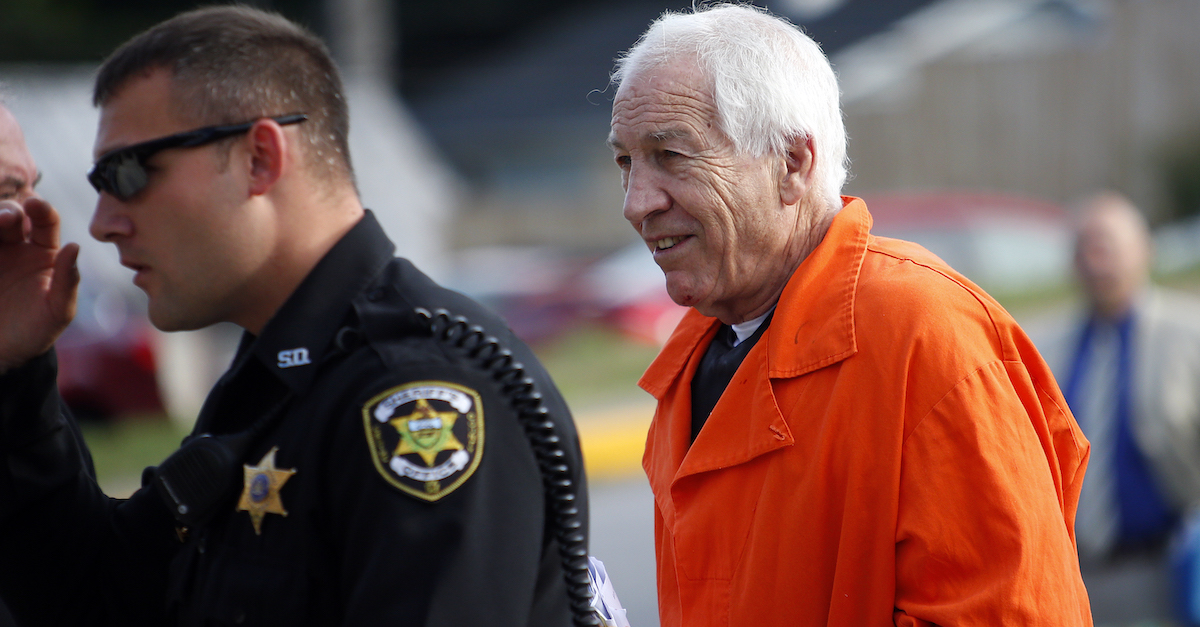
The Pennsylvania Supreme Court has suspended Frank Fina’s law license for a year and a day after determining that his conduct in the prosecution of infamous child molester Jerry Sandusky violated ethical rules.
Per the Philadelphia Inquirer:
By a unanimous vote, with one justice not participating, the high court found that Fina acted improperly in turning a former top lawyer for Penn State into a witness against then-Penn State president Graham B. Spanier and two senior university administrators.
The university’s chief counsel, Cynthia Baldwin, had been serving as a lawyer for Penn State, Spanier and his two aides. Nonetheless, Fina called her in 2012 as a witness against the three men before an investigative grand jury.
The issue here centered on Fina’s calling of opposing counsel as a witness against her clients in a grand jury proceeding regarding the high-profile Penn State sex abuse scandal and cover-up. The court said that Fina misrepresented the situation to a judge, claiming that the line of questioning would not implicate attorney-client concerns. A lawyer for Fina previously said the “big falsehood is that Frank Fina said to the judge one thing and went into the grand jury and did something else.”
But the Fina opinion, which is available for reading online, got into specifics about the purpose of the rule that the court determined he violated, namely Rule of Professional Conduct 3.10:
A public prosecutor or other governmental lawyer shall not, without prior judicial approval, subpoena an attorney to appear before a grand jury or other tribunal investigating criminal activity in circumstances where the prosecutor or other governmental lawyer seeks to compel the attorney/witness to provide evidence concerning a person who is or has been represented by the attorney/witness.
EXPLANATORY COMMENT
[1] It is intended that the required “prior judicial approval” will normally be withheld unless, after a hearing conducted with due regard for the need for appropriate secrecy, the court finds (1) the information sought is not protected from disclosure by Rule 1.6, the attorney-client privilege or the work product doctrine; (2) the evidence sought is relevant to the proceeding; (3) compliance with the subpoena would not be unreasonable or oppressive; (4) the purpose of the subpoena is not primarily to harass the attorney/witness or his or her client; and (5) there is no other feasible alternative to obtain the information sought.
And Fina wasn’t the only one to be disciplined over the attorney-client privilege controversy. Baldwin, a former Pennsylvania Supreme Court justice, was reprimanded by the court. The opinion in her case is also online.
“In her grand jury testimony, she impermissibly revealed many client confidences, which in turn led to criminal charges being filed against her clients,” the court said.
“Even against this background and with confidence that the Respondent is unlikely to violate our Rules of Professional Conduct again, we find it necessary to impose discipline in the nature of a public reprimand to be administered by the Disciplinary Board,” the court continued, shaming Baldwin. “This is because we are concerned that Respondent has never contemplated, much less expressed, remorse. It is our belief that a public reprimand will reinforce our trust that the Respondent’s legal career will go forward without another blemish.”
These disciplinary opinions, at root, concluded that all of this could have and should have been avoided. If privilege claims were adjudicated as they should have been, then certain criminal charges against former Penn State President Graham Spanier, former Vice President for Finance and Business Gary Schultz, and former Athletic Director Tim Curley would not have been jeopardized.
“Poignantly, as a result of [Baldwin’s] disclosures of client confidences before the grand jury in violation of Rule 1.6, certain criminal charges against the Penn State administrators were not able to be prosecuted,” the court noted.
And according to the court, Fina’s “misrepresentations” meant that a crucial hearing–which could have prevented this outcome–never occurred.
“Absent Fina’s misrepresentations, the supervising judge could have (and presumably would have) held a hearing to adjudicate the privilege claims. Had the judge found that privilege applied, Baldwin would not have been permitted to testify, eliminating the issues that arose later, issues that caused criminal charges to be quashed,” the court said.
“Instead, had the judge found that no privilege existed, the issue could have been subject to an interlocutory appeal. With the privilege concerns conclusively litigated, any permitted testimony and resulting indictments would have been insulated from reversal on this basis,” the court continued. “This unfortunate circumstance demonstrates that adherence to Rule 3.10 protects not just the attorney-client relationship, but the prosecution as well.”
Fina’s lawyer Joe McGettigan said he would attempt to have the Supreme Court of the United States review the case.
Baldwin’s lawyer Robert Tintner similarly expressed disappointment with this turn of events.
“We are disappointed with the outcome of the Supreme Court’s decision, particularly after the factual findings of a judge of the court of common pleas and the hearing committee who held evidentiary hearings and concluded that our client did not breach any ethical rules,” Tintner said.
[Image Justin K. Aller/Getty Images]